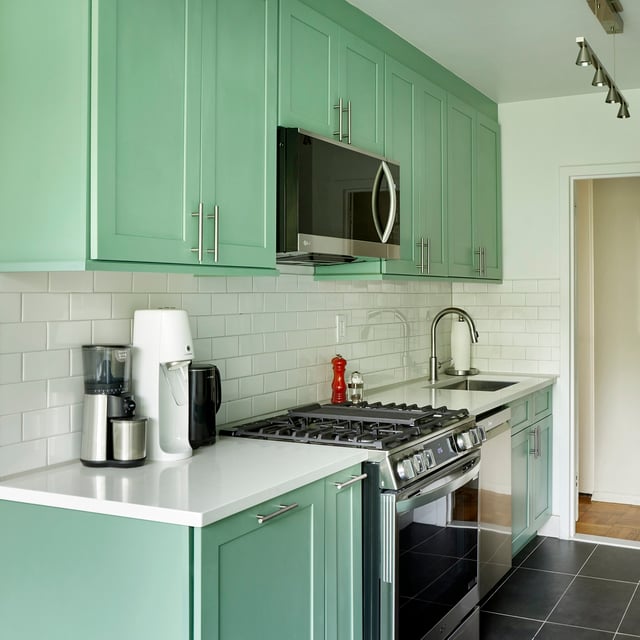
Kitchen
Ideas for Transitional Kitchen Design
12.23.2025
Our New Year savings event is here: Get up to $6,500 off your project today (terms apply).


In This Article
Are you a New York City homeowner planning to remodel your kitchen? Before you even hire a contractor or design-build firm, make sure you understand any home renovation regulations that apply to you.
Start by navigating the building codes and requirements for kitchen remodel permits in NYC. This process can be complex, but getting the right legal information that applies to your situation is crucial for avoiding any fines or construction delays.
In this guide, you’ll find answers to your questions about NYC kitchen remodel permits. Learn about which permits are necessary and how to obtain them, so you can successfully kick off a stress-free kitchen renovation.
⚠️ This article is for informational purposes only and should not be construed as legal advice. For your specific situation, always seek appropriate counsel and refer to the local laws applicable to your home renovations.
Before starting a home renovation project, it’s crucial to obtain any applicable kitchen remodel permits required by the Department of Buildings (DOB). Permits ensure that the work is code-compliant, which helps protect the structural integrity and overall safety of your home and any adjacent units.
Most of the time, you’ll need a permit for your NYC kitchen renovation. That said, the specific types of required kitchen remodel permits depend on the scope of your renovation project. For example, you might not need a permit for certain cosmetic updates, but you will need a permit for structural changes.
Even if your renovation doesn’t require any city permits, you should always check if your renovation plans need approval from your property management company, co-op board, or the like. Whether it’s a cosmetic change or more complex renovation plans, make sure you’re following regulations put forth by both the city and your building.
Learn more: A Step-by-Step Guide to NYC Condo and Co-op Board Approval Processes for Renovations
Different types of kitchen renovations require different permits. The following are some of the most common types of renovations and their corresponding permit requirements (if any).
Types of renovations: replacing sinks, refrigerators, dishwashers.
Permit required? No, as long as the replacements are installed in the same spots as their previous counterparts, without requiring any structural renovations.
Types of renovations: adding or relocating any plumbing or electrical fixtures, such as adding new electrical outlets, rerouting gas pipes, or moving a sink to a different part of the property.
Permit required? Yes, any electrical or plumbing alterations require the corresponding renovation permits to keep your building safely up to code.
Types of renovations: HVAC installation or changes, such as to kitchen exhaust systems.
Permit required? Yes.
Types of renovations: installing cabinets, countertops, kitchen islands.
Permit required? No, but these must be installed by a contractor who’s licensed through the Department of Consumer Affairs.
Types of renovations: resurfacing the top layer of floors (with tile, wood, laminate, etc).
Permit required? No, but if your floor renovation requires anything below surface level—such as plumbing or structural adjustments—it’s likely you’ll need a permit.
Types of renovations: structural changes like moving or demolishing a load-bearing wall, which can affect the integrity of your home and adjacent units.
Permit required? Yes, this type of renovation requires an Alterations permit, which must be filed by a Registered Architect or Professional Engineer.
Types of renovations: painting or plastering the walls or ceiling.
Permit required? No.
Learn more on the NYC Buildings website →
| 🏛️ You may require additional approvals from the Landmarks Preservation Commission (LPC) if your building is a designated landmark or located within an historic district. Always consult with the LPC before your renovation—your landmark or historic building may require special permits, even for types of renovations that wouldn’t otherwise need one. |
Typically, for kitchen remodel permits in NYC, you’ll want to budget for somewhere between $2,500 to $5,000. Total costs will vary depending on the type of work requiring a permit. That estimate includes the permitting fees, as well as the costs for licensed renovation professionals to file and insure the permitted work. If a Registered Architect is required for something like rearranging load-bearing walls, then the kitchen remodel permit costs might be higher.
Learn more: The Ultimate Guide to Home Renovation Costs in New York City (2024)
A complete NYC DOB permit application can include:
Any additional application details for NYC kitchen remodel permits will vary based on the types of permits required.
But there’s one thing these NYC permit applications have in common: Only a licensed professional can prepare and submit your kitchen remodel permit application.
Licensed professionals who can submit applications for NYC home renovations include:
Once ready—and with your signoff as the homeowner—your hired professional will need to submit their permit application to the DOB.
Many permits, such as LAA (Limited Alteration Application) or electrical permits, can be approved within a few weeks. Alteration permits, on the other hand, can take up to a few months to get approved. That’s typically because those types of permits require more detailed architectural drawings and DOB reviews due to the project scope and structural risks involved.
Learn more: Understanding Kitchen Renovation Timelines and Phases
If you don’t obtain the proper permits for your home renovation, you could incur a Stop Work Order or even more severe penalties, like being taken to court. Ultimately, that means renovating without required permits can cost you fines, delays, and quite a few headaches that could’ve been avoided.
Looking for the right professional to kick off your home renovation project? Get a free consultation with Block, match with top quality contractors based on your project needs, and easily compare multiple quotes. We’re here to connect you with the resources you need to renovate confidently.

Written by Block Renovation
Are inspections required for kitchen renovations?
Why are permit application fees required?
How can you avoid common pitfalls in the kitchen remodel permits process?

Renovate confidently with Block
Easily compare quotes from top quality contractors, and get peace of mind with warranty & price protections.
Thousands of homeowners have renovated with Block

4.5 Stars (100+)

4.7 Stars (100+)

4.5 Stars (75+)

Kitchen
Ideas for Transitional Kitchen Design
12.23.2025

Kitchen
Modern Rustic Kitchen Designs & Remodels
12.18.2025

Kitchen
Japandi-Style Ideas to Bring to Your Own Small Kitchen Design
12.16.2025

Kitchen
Scandinavian Kitchen Design: Stylish Minimalism
12.16.2025

Kitchen
Non-Tile Kitchen Backsplashes - Alternative Ideas
12.06.2025
Renovate confidently